 Energy is the ability to change or move matter. Energy efficiency means changing or moving the MOST matter with the LEAST amount of energy.
Energy is the ability to change or move matter. Energy efficiency means changing or moving the MOST matter with the LEAST amount of energy.
You can understand energy efficiency by thinking about how you use your own energy to move.
Your Body Is Efficient
Being efficient with your energy means you move in ways that don’t use more energy than necessary. Your body, which is a very efficient user of energy, does this automatically. When you’re tired after a long day of school, you probably don’t do cartwheels, you just walk. If you carry a backpack, you just carry it. You probably don’t swing it in circles around your head.
Good athletes make really efficient use of their bodies’ energy when they move. For example, basketball players make their jump shots as efficiently as possible. Their bodies and the ball travel in the same smooth direction without extra motion. Swimmers practice their stroke to make sure their arms move through the water and their legs kick without extra effort or splashing.
Can you think of other ways athletes move efficiently?
Efficient Technology
Some newer appliances and equipment are built to run super-efficiently. These appliances use a fraction of the energy that non-efficient appliances use to do the same job. When your old appliances break, ask your parents to replace them with energy-efficient models that have a special ENERGY STAR® label. Get tips for buying efficient appliances.
Energy Efficiency Is Important
Using energy efficiently saves our earth’s precious energy resources, helps the environment, and reduces your family’s energy costs.
YOU Hold the Energy Key
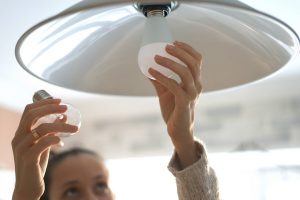 No matter how old or new your appliances are, HOW you use your appliances can determine whether you are making the most efficient use of the energy they run on. When you use energy efficiently, your appliances can do their jobs better, with less energy.
No matter how old or new your appliances are, HOW you use your appliances can determine whether you are making the most efficient use of the energy they run on. When you use energy efficiently, your appliances can do their jobs better, with less energy.
For example, when someone covers a pot while cooking, the heat energy from the burner stays in the pot and cooks the food rather than rising into the air. This cooks the food more efficiently, and saves energy. And when you keep doors and windows closed on hot days, your air conditioner can do its job more efficiently because warm outside air isn’t let into the room.
In these cases, people hold the key to making appliances work most efficiently. The other pages in this section give examples of ways you can use energy more efficiently.
Conservation vs. Energy Efficiency
Conservation means using less energy. Turning out lights and taking shorter showers are examples of energy conservation.
Energy efficiency means using less energy while getting more service from your appliances and equipment. You can do this in two ways:
- By practicing energy-efficient behaviors like covering pots while cooking.
- By using energy-efficient products like LED bulbs, which give the same amount of light for much less energy, or energy-efficient showerheads, which give you a comfortable shower while using less water.
Save Energy at Home
Here are some ways you can use energy more efficiently. Share the Family Connection tips with the adults in your home.
Turn Off the Lights
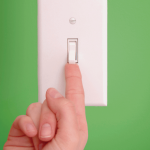 Turn off lights when you are not using them.
Turn off lights when you are not using them.
- Family Connection: Consider changing over to energy–efficient LED bulbs (LEDs) when you replace bulbs that burn out.
Power Down
Your computer, TV, VCR, CD or DVD player, and other small appliances use electrical energy, so be sure to turn them off when you are finished using them.
- Family Connection: Many small appliances use energy even when they are switched off! Plug them into a power strip, and then switch the strip off when you’re finished to reduce this energy waste.
Respect the Fridge
If you find yourself staring into an open fridge for a long time to figure out what to eat, you are wasting energy. Make your choice quickly!
- Family Connection: Make a list of the snacks and drinks you have, or keep snacks in a special section of the fridge.
Shorten Your Showers
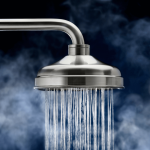 It takes energy to heat water, so you can save energy and water by taking shorter showers or half-full baths.
It takes energy to heat water, so you can save energy and water by taking shorter showers or half-full baths.
- Family Connection: Install energy-efficient showerheads to get the same-quality shower while using less hot water.
Be a Leak Detector
A leaky faucet wastes water, and a leaky hot water faucet wastes the energy used to heat the water as well! Tell an adult about any leaks you find.
- Family Connection: Replace worn-out fixtures, washers, and hose connections to correct and prevent water leaks.
Turn Down the Heat
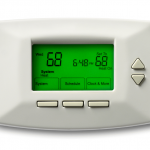 Set your thermostat to the lowest temperature that still keeps you comfortable—some recommend 68°F by day and much lower at night.
Set your thermostat to the lowest temperature that still keeps you comfortable—some recommend 68°F by day and much lower at night.
- Family Connection: Change filters regularly—they are usually located in the heating or cooling unit or in a register at the end of a duct.
Use Your Windows
In winter, if windows face south, east, or west, open curtains when the sun shines through to heat your home for free. Close all window coverings at night to retain indoor heat. In summer, do the reverse: Close curtains during the day and open them at night to keep your home cooler.
- Family Connection: When replacing windows, look for the most energy-efficient models you can afford.
Shut the Door
When the heat in your home is on, prevent heat from escaping by closing doors quickly when you enter or leave the house.
- Family Connection: Make sure the fireplace damper is closed when the heating system is on so heat doesn’t escape up the chimney.
Wash Dishes Wisely
Wait until the dishwasher is full before turning it on.
- Family Connection: Select the Air-Dry or No-Heat Dry setting. That way, dishes dry on their own without using electricity.
Wash Clothes Wisely
It takes energy to heat water for washing clothes, so make sure your clothes are really dirty before putting them into the hamper.
- Family Connection: Remind everyone who does laundry to wash full loads and to use cold water whenever possible.
Dryer Details
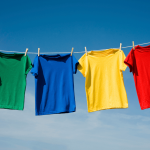 Don’t let the dryer keep running when clothes are already dry. Try a solar dryer—the clothesline!
Don’t let the dryer keep running when clothes are already dry. Try a solar dryer—the clothesline!
- Family Connection: Clean out the dryer lint filter before each load to improve airflow, save energy, and reduce fire risk.
Save Energy at School
 Most schools spend more money on energy than on computers and textbooks combined. Here’s how you can help your school reduce energy waste.
Most schools spend more money on energy than on computers and textbooks combined. Here’s how you can help your school reduce energy waste.
Lights and Computers
- Pick an energy monitor to make sure lights and computers are turned off before recess and lunch, and after school.
- Create a “Save Energy” sign to hang near your classroom light switches to remind people to turn lights off when not in use.
Heating and Cooling
- Make sure books or furniture does not block the vents in your classroom.
- Encourage everyone to keep doors and windows closed when heating or air conditioning is running.
Water
- Turn off the water in the bathroom when you are finished using it.
- Report any water leaks you find to your teacher or school custodian.
Buy Efficient Stuff
When your old lights and appliances need to be replaced, ask your parents to buy energy-efficient models. The ENERGY STAR® label identifies super-efficient products that let you save energy and help the environment.
For example:
- ENERGY STAR certified light-emitting diode bulbs use up to 90% less energy than standard incandescent bulbs and last up to 25 times longer. Replacing a 60-watt incandescent with a comparable LED can save your family up to $80 in electricity costs over the bulb’s lifetime. If every American home did this, we would save enough energy to prevent greenhouse gases equivalent to the emissions of more than 550,000 cars!
- ENERGY STAR certified refrigerators and freezers use about half the energy used by those built before 2001. Replacing an old refrigerator with a new ENERY STAR model can save your family more than $270 over the next five years.
- New ENERGY STAR certified clothes washers clean your clothes with 25% less energy and 33% less water than regular washers. Replacing a standard clothes washer with a full sized ENERGY STAR certified clothes washer can save you up to $40 on your utility bills annually—and can save more than 3,000 gallons of water per year!
EnergyGuide Labels
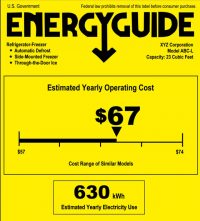 Yellow and black EnergyGuide labels show the cost to run each appliance per year. The lower the dollar figure on an EnergyGuide label, the more efficient the appliance and the less it costs to run.
Yellow and black EnergyGuide labels show the cost to run each appliance per year. The lower the dollar figure on an EnergyGuide label, the more efficient the appliance and the less it costs to run.



